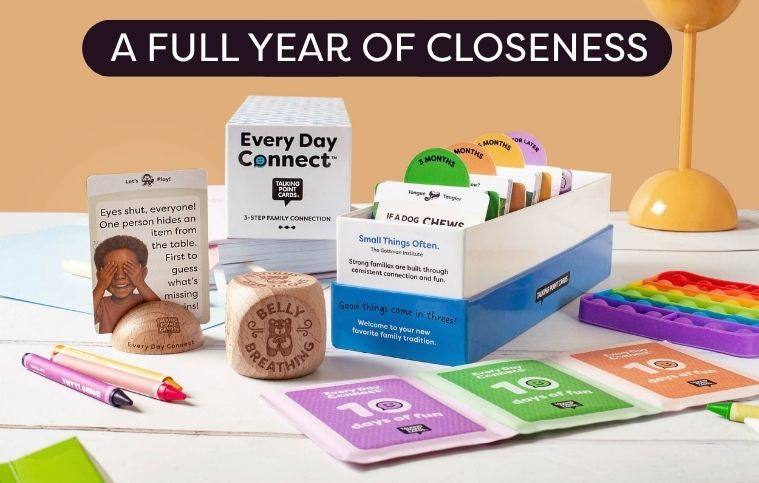SHOP
About

How to Reduce Fights in a Relationship
February 27, 2024 10 min read
Relationships between two people always pose interesting dynamics, especially when there is an element of romance involved. Often, a disagreement can turn into a heated debate, and that can lead to long-lasting tension. That said, conflicts are inevitable in relationships. Every relationship has conflicts, no matter how strong that relationship is.
Remember, reducing your number of fights in your relationship isn't about avoiding disagreements because disagreements will always happen. It’s impossible for two people to be so in sync that they agree with each other on everything.
But, the trick here is to control the dynamic of those disagreements in a way that they never escalate into a fight.
With that said, here are a few tips and tricks to avoid fights with your other half in a relationship.
Key Takeaways
- Conflicts often arise due to triggers, particularly when partners don’t know what each other’s triggers are, or don’t respect them.
- One key to solving conflicts is effective communication, which involves both honesty and active listening.
- Conflicts can be solved and relationships strengthened by setting boundaries, communicating openly, and by collaborating and working towards shared goals.
If you’re having trouble solving conflicts with your partner, the simple questions and helpful talking points provided by Talking Points Cards (Couples Edition) could be just what you need to get your relationship back on the right track.
1. Recognizing and Respecting Triggers
A trigger is something that sets you off emotionally, something that might make you feel sad, angry, or uncomfortable in any other way. As is the case with everybody, people have different triggers. What upsets one person may not upset another, and when you're in a relationship, you have to be mindful of things that may be a trigger for your partner.
Why Respecting Triggers is Important
Understanding what your partner’s triggers are is very important for a variety of reasons, with avoiding huge fights being one of them. If you can avoid saying or doing things that upset your partner, this is a great first step in avoiding huge disputes.
More than anything else, recognizing, respecting, and avoiding triggers allows for much better communication between couples, especially concerning sensitive topics. It's about being able to communicate with somebody in such a way that important issues are addressed without emotional triggers being activated.
More than that, triggers are a result of emotional or traumatic events. If you keep doing or saying the things that trigger someone and take them back to a traumatic event, you, the person that they cherish and adore, will end up becoming a source of pain for them. This won’t just hinder their ability to recover from the event, it’ll also affect the trust factor in your relationship.
How to Recognize and Respect Triggers
It's really easy to say that you should respect triggers to avoid conflicts, but doing so is more difficult than you might think. So, how do you respect and recognize someone's triggers?
Honest Communication
Openly and honestly communicate with your partner. Tell them what your triggers and sensitivities are, and if possible, ask them the same. This is a conversation that should not be approached with judgment, and it requires great sensitivity, but solid communication is often the first step in preventing conflicts.
Active Listening
Engaging in some active listening is another great way to recognize what someone else's triggers are. Although someone might not directly tell you what their triggers are, their stories, actions, and behavior in general may provide you with an indication of what sensitivities those people could have. Moreover, someone might tell you what their triggers are, which means that you really need to listen and try to understand.
Education
You may also want to educate yourself about the triggers of your partner. For instance, if your partner has triggers related to mental health, such as anxiety, depression, or PTSD, you should educate yourself about it. Educating yourself about mental health will help you deal with these situations as they arise.
Establish Boundaries
Boundaries are also important to establish. If you know what your partner's triggers are, and moreover what you should and should not talk about, especially in a specific time or situation, it will help avoid conflicts. If you never tell someone what your boundaries are, they won't know when they've crossed them.
2. The Power of the Pause
In the heat of a moment, when you're having an argument or a fight with a partner, it can be really easy to say things that you don't mean. The effects of these things could range from being temporarily hurt to damaging a relationship permanently.
Don't just blurt out the first thing you think, especially if it might be harmful or derogatory. This is especially the case if what you're about to say involves some kind of trigger that most certainly sets off your partner.
Sometimes it's best to just be quiet and take a pause. If you can't be quiet in the same room as your partner, spending a few hours or even a couple of days apart might be best. Nothing good ever happens when people are heated and emotional, and this heightened state of emotion usually leads to big fights that end up being relationship killers.
If at all possible, take a step back, let everyone calm down, assess the situation, and then move forward. If you are taking a break, make sure your partner knows that. Walking out of the room without saying a word can be perceived as disrespectful behavior and your partner will feel much better knowing that you’re just taking a time out and not abandoning them or the situation.
3. Embracing a Positive Outlook
Solving disputes in relationships and reducing fights almost always comes down to having a positive outlook. If you go into a situation with a negative outlook, things will start to look bleak regardless of what the situation is actually like.
If you expect your relationship to last, being able to maintain a positive outlook in the grand scheme of things is very important. You need to remember that just because you have one conflict or disagreement doesn't mean that all is lost and the time you’ve spent together is moot.
Having a positive outlook on your relationship, and remembering that the two of you love each other when it comes down to it, is important for ensuring that conflicts don't unnecessarily escalate, and that they can be resolved in a constructive manner.
How to Foster Gratitude and Positivity
Yes, maintaining a positive outlook in relationships can at times be difficult, especially if the conflict you're experiencing is a particularly challenging one. However, with the tips below, you and your partner can work to foster more positivity and gratitude within a relationship.
Be Actively Grateful
A good way to foster gratitude in a relationship is to actively practice it, by which we mean actively being grateful to your partner, and letting them know about it. Tell them how thankful and how grateful you are for the little things that they do. These simple little things let your partner know you appreciate them, even when times get tough.
Focus on the Positives
Although every relationship has negative aspects, focusing on the positive aspects is a good way to foster good feelings. Hypothetically, let’s suppose your partner is a bit impatient at times. If you see yourself thinking about them, try to push their impatient image out of your head and focus on the positive. The bottom line is that everyone has their faults, and there’s a pretty good chance that you do too. If you only focus on a person's faults, then the relationship will never last.
Positive Affirmations
A big problem in relationships is often that partners will point out when they dislike something about their partner, such as a behavior, but they won't point out when the partner does something right. This can lead to feelings of resentment and inadequacy.
If you constantly tell your partner what they're doing wrong, it's going to make them feel really bad about themselves, and it will lead to conflicts in the relationship.
However, if you use positive affirmations, and you keep encouraging your partner, complimenting them, and being constructive, the chances of reducing fights are far greater.
Control Your Tone and Language
In an argument, you can either say stuff that is logically correct or logically incorrect. Either works just fine since both ways you are following logic. But, one specific circumstance where there is no logic is when you’re either yelling at your partner or cursing at them.
There isn’t a single circumstance where cursing at someone or yelling at them improves the dynamic of a conversation so it’s best to avoid this at all cost.

4. Effective Communication Techniques
As you might have gathered by now, the trick to preventing extreme conflicts from happening in relationships is to communicate effectively. However, this means knowing what effective communication involves. Here are some quick tips on how to communicate better.
Use “I” Statements
Try using “I” statements, such as “I feel”, as opposed to “you” statements, such as “you make me feel”. This allows you to express your emotions and feelings without sounding accusatory in nature.
Active Listening
Active listening is another part of effective communication. Yes, you can nod your head, make eye contact, but don't interrupt your partner when they're talking. Active listening is about showing that you're actually listening and taking in the information, as opposed to just waiting for your turn to talk.
Clear Communication
Always be clear when you're communicating. You don't need to be so direct that you're insulting, but you need to be clear, specific, and concise, so that your true feelings are accurately conveyed to your partner.
Be Empathetic
Try to practice some empathy. Although you might not necessarily agree with your partner's viewpoint, trying to understand where they're coming from can help foster a sense of trust, understanding, and it may lead to some conflict resolution.
Take a Break
Sometimes, effective communication involves not communicating at all. If both sides are very angry and the conflict has come to a standstill, using a pause or break may be beneficial, so that everyone can cool down before coming back to the negotiating table.
Don’t Jump to Conclusions
Never just jump to conclusions either. Jumping to conclusions is a great way to make a conflict even worse, especially if those conclusions are completely untrue and unwarranted. Try to give your partner the benefit of the doubt, especially if they are trying to explain themselves.
5. Setting Boundaries for Healthy Disagreements
One of the worst things you could do in an argument is to cross boundaries that should never be crossed, and those boundaries are ones you'll become aware of the longer you spend with the same person.
The fact is that everyone has their boundaries when if crossed, may trigger them and cause a conflict to worsen.
Furthermore, there are also various boundaries between people who are in a relationship that need to be respected, such as constantly bringing up the past or calling each other names. Let's take a quick look at some of the best ways to establish and respect boundaries.
- Never try to talk about boundaries in the middle of a conflict, but rather try to discuss your boundaries when everyone is calm. This way, everybody knows what everyone's boundaries are, so they won't be crossed during a conflict.
- Always be clear when setting boundaries. Being imprecise or unclear when setting boundaries leads to conflicts, especially when one person doesn't really know what those boundaries are. Make sure that boundaries cannot be misinterpreted in any way.
- Although it has nothing to do with actually setting boundaries, one boundary that should always be set is avoiding public arguments. Arguments and disagreements should always be private because when they happen in public, it’s going to be embarrassing for both parties.
- Boundaries surrounding a conflict should also involve rules about pausing the conflict, or in other words taking a timeout. Both partners need to recognize when a discussion or argument becomes far too heated, and when it's time for a few minutes to cool off.
- The bottom line is that boundaries need to be mutually respected, and if you have a boundary that you expect your partner not to cross, then you need to do the same in regards to them.
6. Seeking Solutions Together
One of the big issues with arguments, and with human nature in general, is that when we have a fight or a conflict, we aim to win it and prove that we’re on the right side. While that may be satisfying for our ego at the end, it’s not going to be a win for your relationship.
If you’re in a mature relationship, you have to realize that winning an argument is not the same thing as resolving it. Actually winning an argument is coming to a practical solution together where both sides know what to do moving forward to avoid this argument in the future.
It's about being able to collaborate and to work together to find an amicable solution, rather than to simply win the argument, which will leave one person feeling much worse than the other.
7. Knowing When to Seek Help
There are times when a conflict might be past the point of resolution, at least as far as keeping the resolution within the relationship is concerned.
Sometimes the fight might have gotten to the point where both parties can no longer see or think clearly, and are only concerned about their side, their point of view, and ultimately winning the argument.
If you find that you and your partner cannot sit in the same room and talk to each other without getting into a fight, then it might be time to seek help. A therapist or a relationship counselor can provide you with new strategies and perspectives, as well as tools to help manage disputes in a relationship.
Explore Talking Point Cards as a tool to improve communication, deepen understanding, and effectively resolve conflicts in your relationship.
How to Reduce Fighting in a Relationship - Conclusion
To reduce conflicts and fights within the relationship, it really comes down to effective communication, respect for each other, and mutual understanding.
If you can manage to get through the first few minutes, calmly discuss what the issue is, and then brainstorm solutions, you should be able to get past conflicts with your partner.
Use all of the strategies discussed above, and try to incorporate Talking Points Cards into your relationship. These special Talking Points Cards can provide couples with the tools needed to effectively solve a conflict by asking the right kinds of questions.






